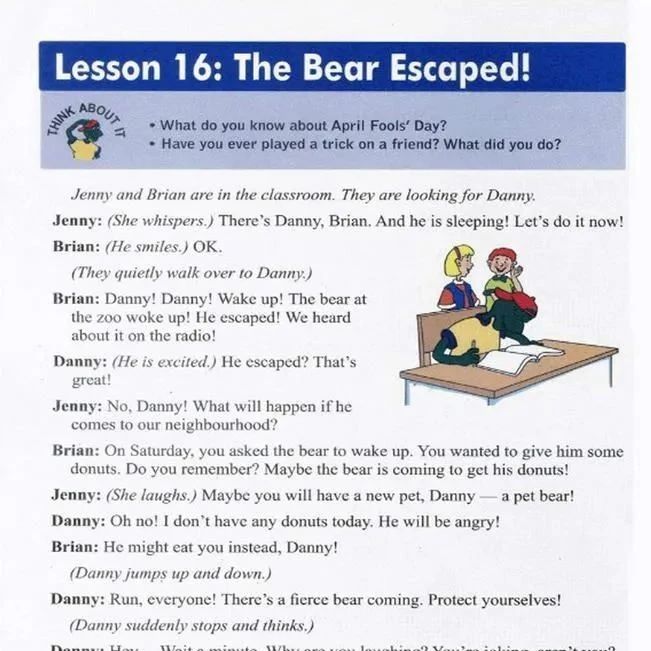冀教版初中英语八年级下册lesson16(附本课单词默读、课文朗读、课文翻译及重点句

冀教版初中英语八年级下册lesson16
01
单词朗读
1.escape v.逃走;逃走
2.fierce adj.凶猛的;凶狠的
3.protect v.保护
4.fool n.愚人
02
课文朗读
03
课文翻译
Jenny and Brian are in the classroom.
詹妮和布莱恩在教室。
They are looking for Danny.
他们在寻找丹尼。
(She whispers.)There’s Danny, Brian.
(她低声说。)丹尼在那儿,布莱恩。
And he is sleeping! Let’s do it now!
他在睡觉!我们现在开始行动吧!
(He smiles.) OK.
(他微微一笑。)好的。
(They quietly walk over to Danny.)
(他们悄悄地走向丹尼。)
Danny! Danny! Wake up!
丹尼!丹尼!醒醒!
The bear at the zoo woke up!
动物园里的熊醒了!
He escaped! We heard about it on the radio!
他逃跑了!我们在广播里听到的!
(He is excited.)He escaped? That’s great!
(他很兴奋。)他逃跑了?那真是太棒了!
No,Danny! What will happen if he comes to our neighbourhood?
不,丹尼!如果他来到我们附近,会发生什么?
On Saturday, you asked the bear to wake up.
在星期六(那天),你让熊醒醒。
You wanted to give him some donuts.
你想给他一些面包圈(吃)。
Do you remember?
你记得吗?
Maybe the bear is coming to get his donuts!
也许熊要过来拿他的面包圈!
Maybe you will have a new pet, Danny – a pet bear!
丹尼,也许你将会有一只新的宠物——一只宠物熊!
Oh no! I don’t have any donuts today.
哦,不!我今天没有面包圈了。
He will be angry!
他会生气的!
He might eat you instead, Danny!
他也许会吃掉你的,丹尼,!
(Danny jumps up and down.)
(丹尼上窜下跳。)
Run, everyone!
我们跑吧!
There’s a fierce bear coming.
有一只凶猛的熊过来了。
Protect yourselves!
保护你们自己!
(Danny suddenly stops and thinks.)
(丹尼突然停下来想了想。)
Hey… Wait a minute.
嘿……等一下。
Why are you laughing?
你们为什么笑?
You’re joking, aren’t you?
你们在开玩笑,不是吗?
(They point at Danny.) Happy April Fools’ Day!
(他们指着丹尼。)愚人节快乐!
04
重点句 / Key points
1.What will happen if he comes to our neighbourhood?
如果他来到我们附近,会发生什么?
if”如果”,它引导的句子叫作“条件状语从句”,if he comes to our neighbourhood就是“条件状语从句”,那What will happen就是“主句”了。
在含有“条件状语从句”的句子中,如果”主句”用了一般将来时(或含有情态动词或是祈使句),那么“条件状语从句”要用一般现在时。
a.We will go to the zoo if it doesn’t rain tomorrow.
如果明天不下雨,我们就去动物园。
b.I will punish him if he copies your homework again.
如果他再抄你的作业,我就要惩罚他了。
c.You can use my dictionary if you don’t know a word.
如果你遇到不认识的字,你可以用我的词典。
d.Let’s help her if she is in danger.
如果她遇到了危险,咱们要帮助她。
2.There’s a fierce bear coming.
有一只凶猛的熊过来了。
There be+…+doing sth. 有……正在做某事。
There is a boy singing under the tree.
有一个男孩正在在树下唱歌。
There are some students cleaning the classroom.
有一些学生正在打扫教室。
3.You’re joking, aren’t you?
你们在开玩笑,不是吗?
这是一个反意疑问句。反意疑问句一般由两部分构成,前半部分是一个陈述句,后半部分是一个简短问句。如果前半部分是肯定句,则后半部分用否定形式,如果前半部分是否定句,则后半部分用肯定形式,
He is from Xi’an,isn’t he?
他来自西安,是吗?
Jenny doesn’t like eating meat, does she?
詹妮不喜欢吃肉,对吗?
She is never late for school, is she?
她上学从来没有迟到过,是吗?
注意:反意疑问句前半部分的陈述句中含有never”从不”、few”几乎没有”、little“几乎没有”或nothing“什么都没有”等词时,也被看作是否定句。
4.They point at Danny.
他们指着丹尼。
point at与point to。两词均意为“指着”“指向”。
1)point at一般表示“指着离说话者距离较近的人或事物”,强调指的对象,
Don’t point at the words while you’re reading.
读书时不要(用手)指着字。
2)point to一般表示“指着离说话者距离较远的人或事物”,强调指的方向,
He pointed to the house on the other side of the river and said that was his home.
他指着河对岸的房子说那是他的家。
1)当事物作主语时,只能用point to,而不能用point at,
The building points to the west.
这座大楼朝西。
2)point to一般不可拆开使用,而point at可拆开使用,
point…at…“拿……指着……”。
He pointed a knife at her face, but she was not scared.
他拿刀子指着她的脸,但她并不害怕。
5.There comes the bus. 汽车来了。
There goes the bell. 铃响了。
这类倒装句,如果主语是代词,则谓语动词仍位于主语之后。
There he is! 他在那儿!
6.We heard about it on the radio!
on/over the radio 的意思是“通过无线电广播(广播);收音机上”。
Today, I heard another Michael Jackson song on the radio.
今天,我在广播中听到一首迈克杰克逊的歌。
7.There’s a fierce bear coming.
非谓语动词coming是bear的定语,相当于定语从句 that is coming。
There is a schoolbag lying on the ground.
地上有个书包。
本课词组
1.look for 寻找
2.walk over 走过去
3.wake up 醒来;唤醒
4.hear about 听说;得知
5.ask sb. to do sth. 要求/请求/让某人做某事
6.want to do sth. 想做某事
7.up and down 上上下下,来来回回
8.There be+…+doing sth. 有……正在做某事。
9.wait a minute 等一下;等一会儿
10.You’re joking, aren’t you?
你们在开玩笑,不是吗?
11.point at 指着
12.April Fools’ Day 愚人节
Happy April Fools’ Day 愚人节快乐
·本课练习题·
单词填空
本文链接: https://www.yizhekk.com/0149282811.html








